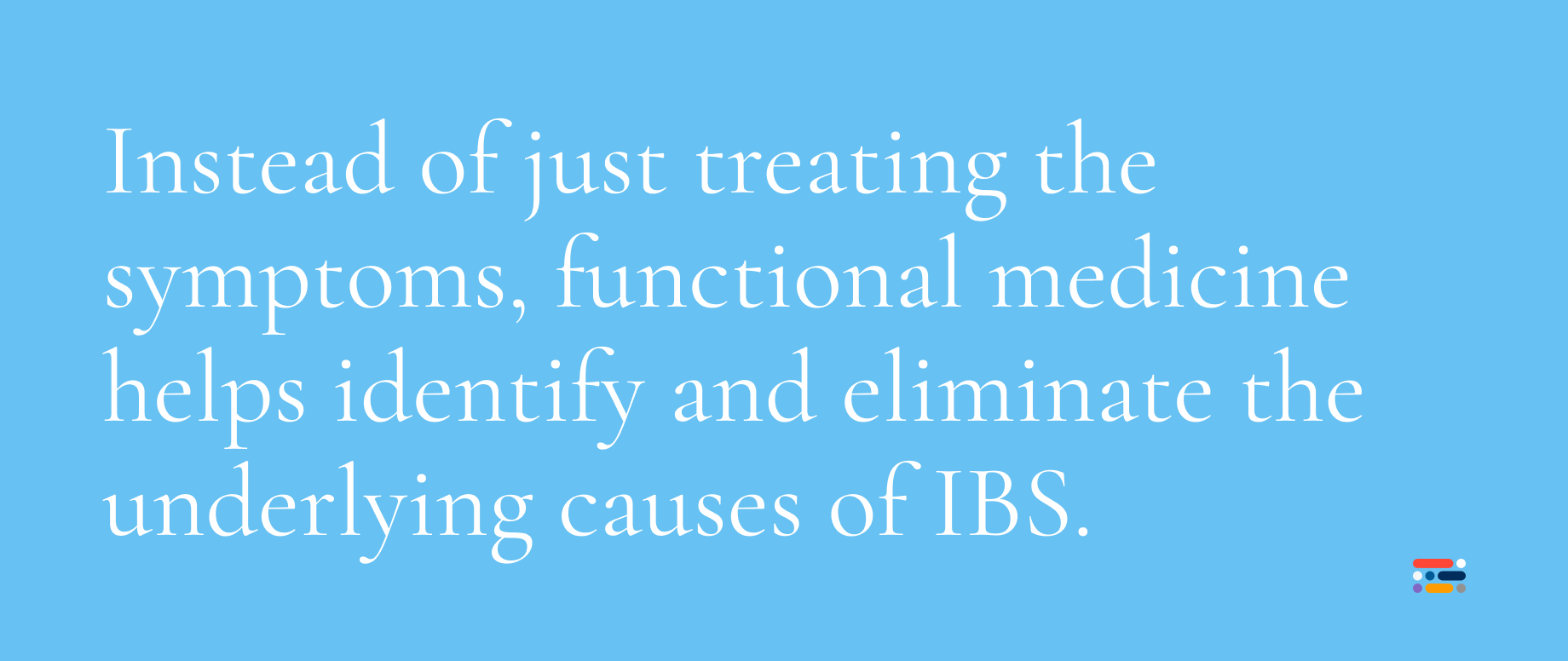We use cookies to enhance your browsing experience and analyze the performance of our website. By clicking Continue, you agree to the use of cookies. For more information, please see our Privacy Policy or update your Cookie Preferences.

If you've ever been diagnosed with Irritable Bowel Syndrome (IBS), you might have felt frustrated or confused about what it really means. The term IBS is often thrown around without much explanation, leaving many people wondering if it's just a vague diagnosis or a real medical condition. It's estimated that up to 45% of certain populations globally suffer from IBS, making it one of the most common gastrointestinal disorders.1

People are told IBS will never go away, and that it is a condition they will have to manage long-term. The truth is, that many people diagnosed with IBS have a treatable underlying condition causing the symptoms.23
Let's explore the symptoms, causes, diagnosis, and treatment options for IBS that you do not hear from mainstream medical sources. We'll also discuss practical tips for managing its impact on your daily life for lasting relief.
IBS is a chronic gastrointestinal (GI) disorder that can be debilitating for some people, often lasting for years or even decades. Symptoms can include:
A physical examination, routine testing, and procedures like colonoscopy show that everything is normal. There are no underlying anatomical or structural abnormalities that explain the symptoms.4
When IBS patients receive their diagnosis, it is often disappointing because it does not explain why they have this problem. The diagnosis basically states the obvious - you have symptoms of an irritable bowel - how frustrating!
The Rome IV Criteria was created to classify IBS as a distinct condition. It states that a person has had symptoms for 6 months or longer. But here's the problem - even with an IBS diagnosis based on the Rome Criteria, you still don't have answers as to why you have IBS.
Furthermore, patients may endure invasive and expensive procedures like colonoscopy to rule out more serious problems like Inflammatory Bowel Disease (IBD) or cancer. Lactose intolerance testing, blood testing for conditions like celiac disease, and basic stool testing might be ordered, only to be told nothing is wrong and they have IBS.
For most people, the journey ends there - no further workup.
Conventional diagnostics and the Rome Criteria tell us someone has IBS, but they don't tell us why.

IBS is a label, it isn't the why.
Many IBS-like symptoms overlap with treatable gut issues. Comprehensive stool testing can reveal patterns tied to digestion, inflammation and immune response, and microbial imbalances to help guide your targeted plan.
These acronyms are commonly mixed up - even clinicians can confuse them. IBD is Inflammatory Bowel Disease, an umbrella term for Crohn's Disease, Ulcerative Colitis, and other diseases which can have very serious symptoms and cause damage to the GI tract. While IBS is a serious condition that can ruin a person's quality of life, it's not associated with the extensive GI damage and inflammation that comes with IBD.
You may wonder, if no physical abnormalities are detectable, then what's the origin of the IBS pain? What's causing the diarrhea, constipation, or gas?
IBS is grouped under the classification 'disorders of gut-brain interaction' (DGBIs), which means there are changes in the way the brain and gut communicate. This can affect intestinal muscle contractions, and how pain is perceived. People with IBS also have changes in their gut microbiota (dysbiosis) and gut barrier breaches (leaky gut) leading to low-grade inflammation.6
These changes can be linked to several root causes:
Many IBS patients are fed up with endless suffering and continue searching for answers. There are many other conditions with symptoms that overlap with IBS.
Comprehensive stool testing is not commonly included in standard medical assessments and goes beyond the scope of a typical assessment by examining a variety of markers that explore several functional areas potentially contributing to symptoms. Markers of digestion and absorption, inflammation and immune status, and bacteria, yeast, and parasites can all provide insight into the root cause of symptoms. These are treatable findings that can resolve a patient's condition! In fact, one study showed that more than 80% of tests run on subjects with IBS-like symptoms had potentially treatable conditions that produced the IBS-like symptoms.
Abnormal values suggesting dysbiosis, food allergy, parasite infection, exocrine pancreatic insufficiency, or gastrointestinal inflammation were the most common findings.12
When the causes for a condition are vague or cannot be identified with conventional testing, it is challenging to know how to treat - many clinicians just end up treating the symptoms. Current conventional treatment options for IBS include soluble fiber, laxatives, antidiarrheals, antibiotics, antidepressants, and other medications.13
Stress management, a food diary, and exercise might also be recommended.14

Relief from IBS may be within your reach. Improving gut health with targeted treatments, and diet and lifestyle modification can lead to improved quality of life. If you are searching for causes for your IBS symptoms, consider the following steps:
There are a few tests that can provide answers to why you have IBS symptoms. All the conditions revealed with this testing are treatable and can result in substantial symptom improvement.
You might try an elimination diet for 3-6 weeks or longer to identify hidden or unknown food triggers. Common culprits include gluten, dairy, soy, eggs, corn, and artificial additives. Some doctors recommend a low FODMAPs (fermentable oligosaccharides, disaccharides, monosaccharides, and polyols) diet for IBS, which is also a treatment for SIBO.18 The low FODMAPs diet is not a good long-term solution because many of these foods are important for feeding the healthy bacteria in your gut.
Start by removing harmful factors that damage the gut and adding foods that repair it.
In some cases, supplements may be necessary to address specific gut imbalances or deficiencies, such as digestive enzymes or probiotics. Glutamine is a supplement that heals leaky gut and decreases IBS symptoms.25 It is best to discuss supplements with a practitioner who is well-versed in gut health.
Chronic stress can trigger IBS.26 Stress disrupts microbiome balance and leads to leaky gut.2728. Incorporate stress-reduction techniques into your daily routine, such as meditation, yoga, deep breathing, or physical activity.
Physical activity can help improve digestion and relieve stress. There are many studies showing improvement in IBS symptoms with exercise.2930
If you need help navigating a holistic approach to IBS, consult a healthcare professional, such as a functional medicine practitioner for personalized guidance and treatment options.
IBS is a complex condition with multiple underlying factors. Rather than being a single diagnosis, it has been suggested that IBS should represent an 'umbrella' diagnosis made up of different, treatable conditions.31
While conventional medicine often focuses on symptom management, functional medicine offers a more comprehensive approach that addresses the root causes of IBS. By understanding and addressing factors such as SIBO, food sensitivities, leaky gut, dysbiosis, and stress, root cause medicine aims to provide long-term relief and improve the overall health and well-being of individuals with IBS.
If you would like to learn more about the difference between IBS and IBD, and Genova's stool inflammatory markers, check out GI Inflammation... What Now? from The Lab Report podcast - a great resource to learn more about functional medicine and addressing the root causes of disease.
This article is meant for educational purposes only and is not meant to be misconstrued as medical diagnosis or treatment advice.